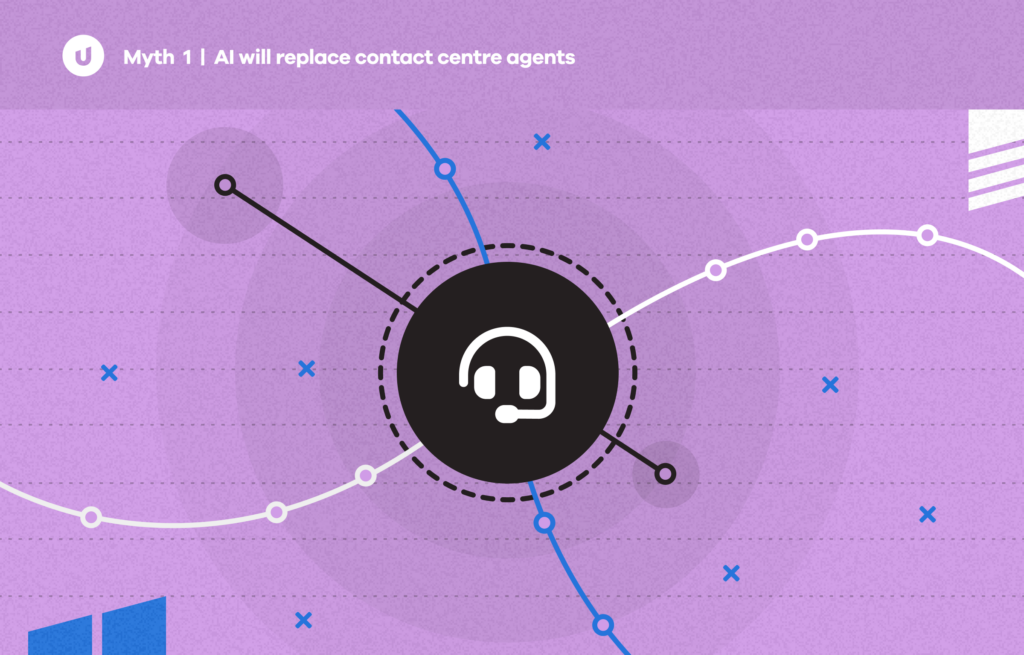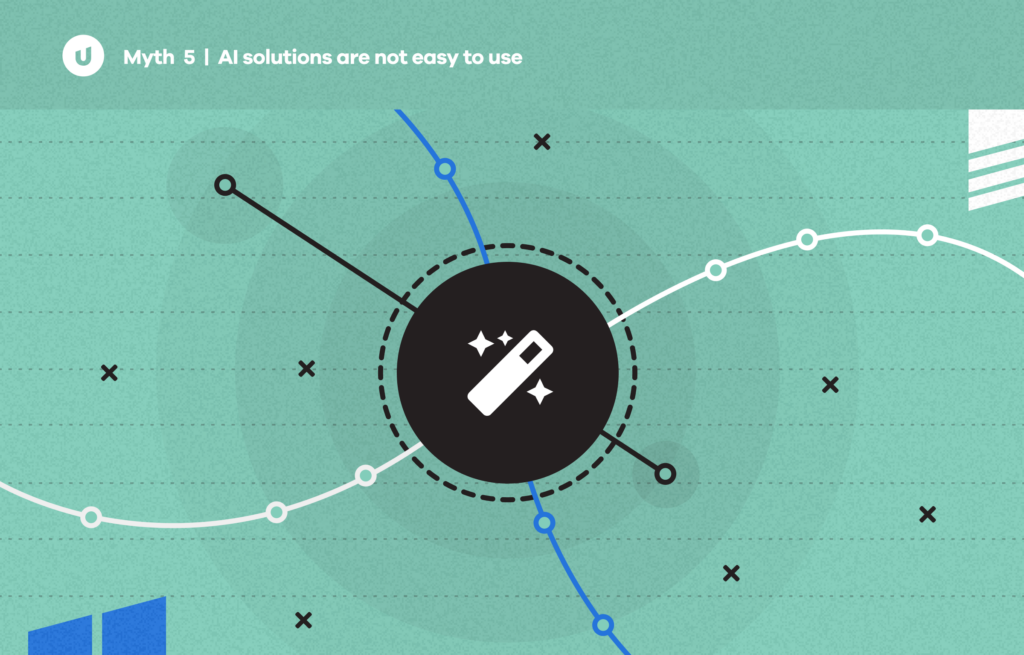Contact Center AI Solutions
Contact Center AI Solutions
Is your contact center struggling to keep up with customer demands? Do your contact center agents feel overwhelmed and burnt out? With help from artificial intelligence (AI), contact centers can revolutionize the agent and customer experience, leading to increased productivity and improved customer satisfaction. In fact, 81% of contact center executives are investing in agent-enabling AI — making it clear that AI is now a necessity.


What are Contact Center AI Solutions?
What are Contact Center AI Solutions?
Contact center AI solutions harness the power of artificial intelligence to automate routine tasks, analyze customer data, and provide real-time insights. AI can be applied to various aspects of contact center operations, including:
- Chatbots and virtual assistants
- Knowledge management
- Enterprise search
- Call transcription
- Customer sentiment analysis
- Predictive analytics
Benefits of Leveraging AI in the Contact Center
Benefits of Leveraging AI in the Contact Center
By incorporating AI-powered solutions, businesses can:
Enhance the customer experience
Enhance the customer experience
Deliver faster response times, increase first-contact resolution rates and personalize interactions.
Increase agent productivity
Increase agent productivity
Automate routine tasks, allowing agents to focus on complex customer issues and build stronger relationships.
Improve operational efficiency
Improve operational efficiency
Optimize workforce management, reduce costs, and improve overall contact center performance.
Leverage data-driven insights
Leverage data-driven insights
Identify trends, customer preferences, and areas for improvement.
Increase scalability
Increase scalability
Handle increased call volumes and fluctuations in customer demand.
Fact vs. Fiction: Debunking AI Myths
Fact vs. Fiction: Debunking AI Myths
There are many misconceptions about AI in contact centers. Let’s clear up some common myths.
-
Fact: AI complements agents by automating tasks, freeing them for complex issues.

-
Fact: Many affordable AI solutions are available for businesses of all sizes

-
Fact: Secure AI solutions are available that comply with data privacy regulations.

-
Fact: Most AI solutions are designed for easy implementation with minimal IT support. Plus, many solutions providers offer implementation support.

-
Fact: User-friendly AI solutions are available with intuitive interfaces for agents.

Contact Center AI in Action
Contact Center AI in Action
Probe CX
Discover how Probe CX was able to elevate the customer experience with Panviva’s AI-powered guidance
AI Contact Center Solutions by Upland Software
AI Contact Center Solutions by Upland Software
RightAnswers
RightAnswers
Connected AI knowledge management for enterprise contact centers and help desks.
Panviva
Panviva
Compliant, omnichannel AI-powered knowledge management for highly regulated industries.
BA Insight
BA Insight
Unlock and power enterprise AI investments, covering the core AI use-cases of search, discovery, augmentation, generation, and delivery.
AI Resources to Help You Thrive
AI Resources to Help You Thrive
FAQs
FAQs
Still have questions about AI and contact centers? Find answers to common questions here.
-
AI works by feeding vast amounts of data into algorithms that learn to recognize patterns. Over time, these algorithms improve their ability to make predictions, decisions, or complete tasks without explicit programming.
-
AI can transform your contact center in various ways. You can use AI to automate basic tasks, improve response times, optimize operations, and make it easier to access knowledge. Common AI solutions include chatbots and virtual assistants, transcription services, and knowledge management and enterprise search solutions.
-
No, AI is designed to complement and enhance human capabilities, not replace them. AI excels at handling repetitive tasks and analyzing data, allowing humans to focus on creativity, problem-solving, and building relationships.
-
AI enhances customer experience by providing faster response times, personalized interactions, and efficient issue resolution. Your organizations can leverage AI to:
-
- Handle routine inquiries with self-service portals
- Help agents easily find what they’re looking for with AI-powered search
- Understand customer needs with sentiment analysis
- Anticipate customer expectations with predictive analytics.
-
AI Glossary Terms You Should Know
AI Glossary Terms You Should Know
Artificial Intelligence (AI):
- The development of computer systems to make them capable of thinking like humans and performing tasks that typically require human intelligence.
Conversational AI:
- Uses large volumes of data, machine learning, and natural language processing to imitate human conversations by recognizing speech and text inputs with the ability to translate their meanings across different languages.
Generative AI:
- Uses machine learning and algorithms to analyze patterns in datasets to then mimic style or structure to replicate a wide range of content including text, images, video, and music.
Knowledge Management:
- The process of identifying, capturing, organizing, storing, and sharing an organization’s knowledge.
Machine Learning:
- Sitting at the AI and computer science intersection, this enables machines to imitate intelligent human behavior and problem solving through data and algorithms.
Natural Language Processing (NLP):
- Uses machine learning to enable machines to recognize, understand, and respond to natural human spoken language, as well as create new text and translate between languages.
Predictive AI:
- Also known as predictive analytics, this uses ML and statistical algorithms to analyze data and make predictions about future events.


